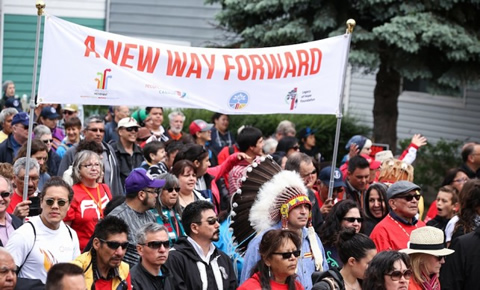As Canada embarks on a journey of restorative justice with its Indigenous Peoples, a group of scholars at U of T’s Jackman Humanities Institute are consulting with peers half a world away to find out how another country sought to heal from a violent and painful episode in its history.
In 1994, South Africa set up its own Truth and Reconciliation Commission to examine the gross human rights violations that occurred during the apartheid era. Neil ten Kortenaar, a professor of English at U of T Scarborough, is among more than a dozen U of T researchers, including several Indigenous people, who participated in a workshop in October at Six Nations territory near Brantford, Ontario. Eight scholars from the University of the Western Cape in South Africa also took part.
The event, part of a planned three-year collaboration between the two universities supported by a grant from the Andrew W. Mellon Foundation, found plenty of parallels between Canada and South Africa but also key differences, says ten Kortenaar. The South Africans, largely cynical about the outcome of their own commission, were startled by the hopefulness the Canadians expressed about theirs.
Twenty years on, the feeling among many South Africans is that their commission failed to come to grips with the broader social legacy of apartheid. “People who committed abuses admitted their guilt,” says ten Kortenaar, “but all of white society had benefited from the system. This wasn’t addressed, leaving the impression that it was a just a few people who had done these things.”
If there is a reason to be hopeful in Canada, says ten Kortenaar, it’s because Canada’s commission has focused more on policy and institutions than on individuals.
The group plans to meet again next year in South Africa, and will compare the impact of colonialism in each country and what’s been done to make each country more just. “The emphasis is on facing up to what’s been done,” says ten Kortenaar.
The Jackman Humanities Institute encourages collaboration among humanities scholars. It was established in 2008 out of a visionary $30-million contribution from Henry N. R. Jackman (BA 1953 Victoria, LLB 1956).
Recent Posts
U of T’s Feminist Sports Club Is Here to Bend the Rules
The group invites non-athletes to try their hand at games like dodgeball and basketball in a fun – and distinctly supportive – atmosphere
From Mental Health Studies to Michelin Guide
U of T Scarborough alum Ambica Jain’s unexpected path to restaurant success
A Blueprint for Global Prosperity
Researchers across U of T are banding together to help the United Nations meet its 17 sustainable development goals






2 Responses to “ Facing Up to Canada’s Past ”
I just came across Carole Drumm's summary of the conference: The South African TRC and the Canadian TRC: A Workshop Woodland Cultural Centre, Six Nations Territory October 20-21 2016.
https://www.humanities.utoronto.ca/TRC_workshop_report_2016
I would love to read the collection of papers that were presented. I am particularly interested in those summarized under the subtitle, "The 'antics' of reconciliation."
I found a link that looked promising but it only had one document: https://www.humanities.utoronto.ca/resources_TRC
Please, can you tell me if there is any way to get a hold of the reports from this conference? Was another North-South dialogue ever hosted?
Prof. Neil ten Kortenaar responds:
The TRC workshop involving academics from the University of the Western Cape and the University of Toronto that took place at Six Nations territory in November 2016 is part of an ongoing Mellon-funded collaboration between the two universities -- more specifically between the Jackman Humanities Institute at Toronto and the Centre for Humanities Research at UWC.
The TRC sector of the collaboration had a subsequent workshop in South Africa on the Missing Subjects and the Subject of Missingness in February 2017. Another is planned on Futures in April 2019, in Toronto.
Some papers from the November 2016 workshop will be published in the forthcoming issue of the Canadian Journal of Comparative Literature.